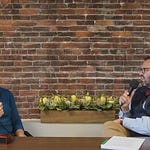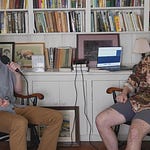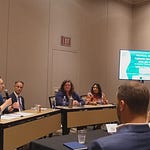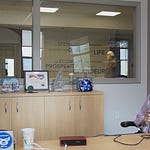This is Mark.
He’s a former tech executive, a two-time survivor of near-fatal addiction, and now a passionate architect of healing communities.
Mark Lefebvre wrote Healing a Village not just to tell his story—but to share a blueprint. In it, he captures how Portsmouth, NH became a model for recovery-ready communities through organization, urgency, and the radical idea that people deserve a second chance.
From IBM boardrooms to Narcan trainings, from childhood trauma to community transformation, Mark brings lived experience, unflinching honesty, and deep-rooted hope to the fight against addiction.
He believes language matters, that recovery is possible for everyone, and that progress happens when we build—patiently, persistently, and together.
Notes:
Healing A Village— available now!
This episode was recorded in Treeline Outfitters in Portsmouth, New Hampshire
Music provided by Sneaky Miles
Episode Summary*
Why did you want to come on the podcast?
Because your show, like my book, is about hope. There's too much cynicism and bad news out there. Healing a Village is my attempt to spotlight what’s working—how communities like Portsmouth, NH are rising to meet the addiction crisis with compassion, coordination, and real change.
What is Healing a Village about?
It’s a practical blueprint for building recovery-ready communities. It documents what we did in Portsmouth: the lessons, the mistakes, the successes. It’s a guide for other communities to act—not just dream—about improving recovery infrastructure.
What’s your personal connection to addiction and recovery?
I’m in long-term recovery—almost 13 years. I spent decades as a high-powered marketing exec at IBM. The pressure crushed me, and I turned to alcohol and opioids. Twice, I almost didn’t make it. That experience transformed my life and gave me purpose.
What has changed about the addiction landscape since you started this work?
Everything. Back in 2012, there was almost nowhere to turn. Now there are detox beds, recovery centers, Narcan access, and—most importantly—a cultural shift. People talk about this more openly. Communities are organizing. It’s still hard, but it’s not hopeless.
How bad was the crisis—and are we making progress?
Yes. In 2024, NH saw a 37% drop in overdose deaths compared to the year prior, outpacing the national average. But 260 lives lost is still too many. The challenge remains urgent, but we're saving lives through tools like Narcan and increased community response.
What sparked the coalition effort in Portsmouth?
We knew change wouldn’t happen unless someone took responsibility for coordination. So we created a separate, neutral facilitating body—the Pine Tree Institute—and focused on one core issue: addiction. That structure let us stay focused and build momentum.
What’s something you’re especially proud of?
We opened a second sober living home for women in Hampton—huge for Rockingham County. And we helped bring harm reduction services, like Narcan training and needle exchanges, into the public health mainstream. These efforts are saving lives, every day.
How do you define a recovery-ready community?
It’s a place with the infrastructure, compassion, and culture to support people at every stage—whether they’re actively using, newly sober, or ten years into recovery. That means treatment options, stigma reduction, workforce development, housing, transportation—all of it.
What do people misunderstand most about addiction?
Language. When you call someone an “addict” or a “druggie,” you reduce their humanity. That stigma blocks housing, jobs, healthcare—even dignity. Words matter. So does where you build recovery housing. NIMBYism is still a major barrier.
Why is the U.S. so deeply affected by this crisis?
We have 4% of the world’s population and consume 88% of the world’s opioids. That speaks to deeper cultural and systemic issues—like untreated trauma, mental illness, and access. It’s not just about bad decisions. It’s about pain, isolation, and coping.
What lessons do you hope others take from your experience?
Start small but stay committed. Create a clear structure. Have a focused mission. Don’t try to do everything at once. And most of all—believe that change is possible. It took us years to build this, but now it’s muscle memory for the Seacoast community.
What do you wish you had known when you started this work?
I wish someone had written this book already. I wish we didn’t have to invent the wheel. But we did—and now that blueprint can help others. There are communities ready to step up—they just need a place to start.
What’s your hope for the future of this movement?
That recovery becomes part of the American fabric. That no one feels ashamed to ask for help. That every town—big or small—knows how to organize and support its people. And that we keep pushing, together, until this crisis is no longer a death sentence.
*This episode summary was generated by an AI analyzing a transcript of the interview. The questions, wording, and written meaning of particular sections may contain slight differences to the original conversation. We include these summaries to give listeners a brief, readable synopsis of the episode. The full episode transcript is available on granitegoodness.com.














